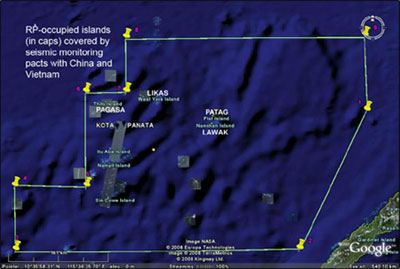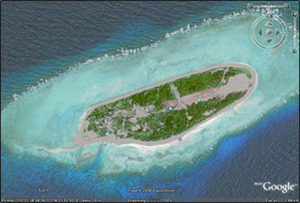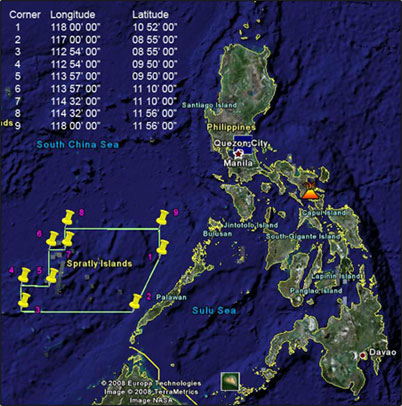(Updated 10:30 p.m.) MANILA, Philippines - The Philippines will not back down from its claim over the "regime of islands" identified in the newly ratified baselines bill despite China's reported strong protest over it, House committee on Foreign Affairs chair Antonio Cuenco said on Thursday. In an interview with reporters, Cuenco said the Chinese government should "cool down" and let the issue on the sovereignty over parts of Spratly Islands and the Scarborough Shoal be settled before the International Court of Justice. Meanwhile, Executive Secretary Eduardo Ermita announced Thursday that the baselines bill might be signed by President Gloria Macapagal Arroyo next week. At the House, Cuenco said: "We reiterate our sovereignty over these islands. If the Chinese government does not like that then let the issue be settled before the International Court of Justice." "Just cool down. We are appealing to the Chinese government to cool down," the lawmaker said.

Cuenco maintained that the Philippine government is willing to talk to China. "They're our friends, they're our closest neighbors in Asia," he said. Despite this, the Cebu City representative said the Philippines would "never" abandon its claims over the islands, even if China threatens to hit back at the Philippines through economic deals. "We will not be threatened by any of these countries and we will never, never abandon our claims thereon," Cuenco said.
"Sovereignty is priceless. We will not bargain our sovereignty at any price, at any cost," he added. For his part, Muntinlupa City Rep. Rozzano Rufino Biazon said the Philippine government's response to China's reported protest, as well as on the custody case of convicted rapist Lance Corporal Daniel Smith, will be a "test" on how the Philippines will hold out against the two of the world's superpowers. "The Philippine position in relation to China's protest against the baselines bill should be consistent with the government stand on the Smith case. Both involve Philippine sovereignty and both are based on decisions by constitutional bodies, that is, Congress and the Supreme Court. And it appears that the executive branch's eventual action will decide if the legislative and judicial branches will be upheld," said Biazon. "This will be a test for the administration since it is now held against the two world superpowers, its counterpart branches of government, and Philippine sovereignty," he said.
Baselines bill defended Press Secretary Cerge Remonde said the reaction of Beijing is "not surprising" since it is also a long-standing claimant of the disputed islands, which were included by the Philippines in the "regime of islands" under the baseline bill. Remonde, however, stressed that the Philippines needs the baseline law to meet the United Nations Convention on the Laws Of the Seas (UNCLOS) deadline in May. "It will be then up to the UN to resolve the issue," he said referring to the May 13, 2009 deadline for the submission of the "the extended continental shelf" or the list of territories of a country. The Chinese Foreign Minister had summoned the Philippines' charge d' affaires Maria Barbers last Wednesday to lodge a "stern protest" over the ratified baseline bill, which Beijing claimed had violated their "indisputable sovereignty" over the Kalayaan Island Group and the Scarborough Shoal. The disputed islands were identified by the Philippine Congress as a "regime of islands under the Republic of the Philippines." This means that the Philippines continues to lay claim over the regime of islands even if it has not been included in the country's territory. Remonde said despite China's protest, the bill "will be put into law" stressing that it is necessary to comply with the UNCLOS and ensure international recognition of the country's archipelagic baselines. "We are doing this to comply with UNCLOS and once complied with, we will get international recognition on what we are claiming as part of our baseline. It will happen but of course there will be other claimants," he said. Foreign Affairs Undersecretary Bayani Mangibin said China's reaction was expected but this same concern of other claiming countries like China was taken into consideration when the bill was crafted.

Mangibin said there was no violation of any sovereign policies adding that it even took the country's officials awhile to craft the law to ensure that all concerns would be considered. He said there are no plans to file any diplomatic protest at the moment, but the Philippines is considering summoning China's own ambassador to the Philippines to "foster dialogue" and eventually "enlighten them" on the issue. "We also share the sentiment of China. They said that they would like to strengthen the relationship of Philippines and China, and this is where we would like to direct our discussion on this issue. As a matter of fact, we are open for dialogue and consultation as provided by the declaration on Conduct in the South China Sea," he said. He also expressed confidence that despite this "misunderstanding," the Philippines and China's relationship would remain. He said the bilateral relations of the two countries have gone a long way and had even been strengthened by the several visits of President Arroyo to China. "It is our hope that the bill will be respected, and that's the reason we are very optimistic that this particular misunderstanding will be resolved…We will make them (China) understand and realize that their concerns have been considered during the crafting of the bill, and in this way they will really appreciate our present position," he said. Asked why China was "reacting" sternly over the bill, Mangibin said it is because China is already "a step ahead" of the Philippines in staking a claim over the disputed islands. He said the important thing is that the Philippines has not recognized and accepted China's claim and that the country is not abandoning its own claim. He said possible threats posed by China, especially since it is one of the superpower countries, had long been present but continued dialogue had prevented any conflict from arising. On plans of some groups to question the constitutionality of the baseline bill, Mangibin said the Philippines is a "democratic country and we will respect that."
- GMANews.TV 





